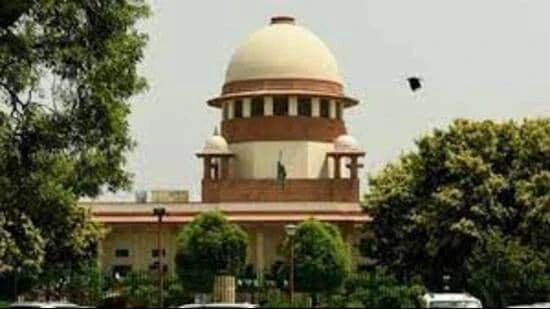The Supreme Court has ruled that landowners whose properties are acquired for a public purpose cannot invoke the right to livelihood to demand rehabilitation or alternative land as a matter of legal right.
In a significant verdict on the scope of Article 21 (right to life and livelihood) in land acquisition cases, the top court held that the Constitution guarantees fair compensation for such acquisition, but not rehabilitation beyond what is provided in law or specific policies.
A bench of Justices JB Pardiwala and R Mahadevan ruled that the deprivation of land for a public purpose, when carried out in accordance with the law, does not violate the right to life and livelihood under Article 21. The court also clarified that the state is not under a legal obligation to provide alternative land or housing to oustees unless such rehabilitation is expressly provided under a policy, and even then, the policy must be applied fairly and within its boundaries.
“We have made ourselves very explicitly clear that in cases of land acquisition, the plea of deprivation of right to livelihood under Article 21 of the Constitution is unsustainable,” the bench held in its judgment on July 14, rejecting the claim of landowners from Haryana who had approached the court seeking alternative plots at subsidised rates as a matter of right after their land was acquired for public purposes.
The judgment, which arose from a series of petitions filed by affected landowners in Haryana’s Kaithal district, also served as a cautionary message to states across India. Calling the litigation “an eye opener”, the court said that populist or appeasement-driven rehabilitation schemes floated by governments often end up complicating the acquisition process and result in prolonged litigation.
“When land is acquired for any public purpose, the person whose land is taken away is entitled to appropriate compensation in accordance with the settled principles of law. It is only in the rarest of the rare case that the government may consider floating any scheme for rehabilitation of the displaced persons over and above paying them compensation in terms of money,” it emphasised.
The bench said that unnecessary welfare schemes, however well-intentioned, must not become standard expectations in every case of acquisition, especially when such schemes are not legally mandated.
“At times the state government, with a view to appeasing its subjects, floats unnecessary schemes and ultimately lands up in difficulties. It would unnecessarily give rise to number of litigations. The classic example is the one at hand,” the judgment said.
Citing earlier judgments, including State of Madhya Pradesh Vs Narmada Bachao Andolan (2011) and Amarjit Singh Vs State of Punjab (2010), the bench asserted that rehabilitation is not a constitutionally guaranteed right.
“It is desirable for the authority concerned to ensure that, as far as practicable, persons who had been living and carrying on business or other activity on the land acquired, if they so desire, and are willing to purchase and comply with any requirement of the authority… be given a piece of land on settled terms. However, the state government cannot be compelled to provide alternate accommodation to the oustees,” the court referenced from the previous judgments.
The bench further drew a clear line between legal entitlement and policy-based benevolence: “Any beneficial measures taken by the government are… guided only by humanitarian considerations of fairness and equity towards the landowners.”
The ruling underlined that even in circumstances where rehabilitation is contemplated, it should be limited to those whose lives are “intrinsically connected to the land, such as rural farmers or families living on subsistence agriculture, and who are rendered “destitute” due to the loss of land or shelter.
The case before the court involved a batch of landowners in Haryana whose properties had been acquired in the 1990s. They claimed entitlement to alternative residential plots under a 1992 rehabilitation policy, insisting that the state was bound to honour that policy and offer them plots at prices fixed more than three decades ago.
The Supreme Court, however, found no merit in the argument. “The respondents are not entitled to claim as a matter of legal right… that they should be allotted plots as oustees only at the price as determined in the 1992 policy,” it declared.
Instead, the court held that the landowners may at best seek relief under the Haryana Urban Development Authority (HUDA)’s revised 2016 policy, which governs allotments of alternative plots for oustees at current rates and conditions. It gave the petitioners four weeks to submit their applications under the 2016 scheme, and directed the concerned authorities to process the requests accordingly.
To prevent misuse of the rehabilitation scheme and the formation of land cartels, the court also imposed strict safeguards. It directed HUDA and the state of Haryana to ensure that “land grabbers or any other miscreants may not form a cartel and try to take undue advantage of the allotment of plots.”
Furthermore, it mandated that the allotment of plots should not be treated as a monetisable asset, and imposed a five-year lock-in on any transfer of the property. “The allottee shall not be entitled to transfer the plot to any third party without the permission of the competent authority and in any case not within five years from the date of the allotment,” it said.
